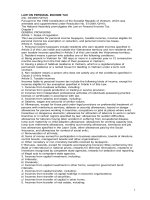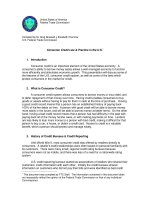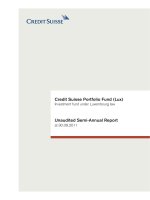Lenz japanese bitcoin law
Bạn đang xem bản rút gọn của tài liệu. Xem và tải ngay bản đầy đủ của tài liệu tại đây (839.39 KB, 215 trang )
Copyright © 2014 Karl-Friedrich Lenz
License:
Creative Commons Attribution-NonCommercial 3.0
Unported
Available as a FREE PDF file at k-lenz.de/btcjapan.
ISBN: 1502353032
ISBN-13: 978-1502353030
CONTENTS
Acknowledgments
i
Introduction
1
Chapter 1: General Issues
8
Chapter 2: Licensing and Oversight
62
Chapter 3: Trading Rules
154
Chapter 4: Tax Law and Criminal Law
174
Karl-Friedrich Lenz
ACKNOWLEDGMENTS
Thanks go to Zoë Markham for the fast turnaround
on the editing of this project, and to Kolin Burges
and Jon Southurst for the permission to use the
photo on the cover of this book.
.
iv
INTRODUCTION
I wanted to know how Japanese law relates to
bitcoin exchanges like MtGox, and to the Bitcoin
network in general. The best way for me to find out
was to write this short book.
I am not going to explain here what Bitcoin
is . Or who MtGox is2. This book is for people who
already know that much.
1
Why would I be interested in such a question?
By a weird coincidence, I was involved in
some of the protests going on at the MtGox office in
January and February 2014. Two threads on Reddit
about these protests got quite a lot of attention and
comments.
One of them was about a guy from Australia
who flew in spending more than 16 hours on the road
just to talk to someone from MtGox in person. I have
talked to him and know his name, but I won't
mention it here, since he asked me not to disclose
that particular detail.
See the "Bitcoin" Wikipedia article at en.wikipedia.org
/wiki/Bitcoin.
2 See the "MtGox" Wikipedia article at en.wikipedia.org
/wiki/MtGox.
1
1
Karl-Friedrich Lenz
He posted a report about his adventure on
Reddit in this thread.3 Which got a score of over 1300
upvotes and over 600 comments.
As I mentioned in that thread4, I was walking
from my university over to the weekly Bitcoin Meetup
in Shibuya. Since the MtGox office is located on my
way there, I happened to notice this protester
standing there with a sign. I thought he might be
interested in joining the Meetup, so I approached him
and told him that there was a Bitcoin Meetup
scheduled close by. And asked if he would be
interested in attending.
He was. So we walked over there together and
discussed his protest on the way.
After he returned to Australia, a second guy
came over from London the next week. He had seen
my post at Reddit and contacted me. We ended up
having lunch together, joined by a journalist from the
Wall Street Journal.
He succeeded in confronting the CEO of
MtGox, Mark Karpeles, and getting that
confrontation on video 5 . The Wall Street Journal
k-lenz.de/btc001.
k-lenz.de/btc002.
5 k-lenz.de/btc003.
3
4
2
Japanese Bitcoin Law
reported on the protest6. Coindesk reported as well7.
The picture on the cover of this book is of
him standing in a snowstorm protesting.
I met some other people involved as well. So
I got a pretty good picture of what was going on.
Very briefly: The MtGox exchange had
suspended withdrawals of bitcoins, allegedly for a
technical reason. They had already just about stopped
withdrawals of actual money before. And on top of
that, they were stonewalling people.
There was no actual money coming out, no
bitcoins coming out, and no information coming out.
And then they moved out of their office space
and gave a "virtual office" address instead.
I wonder what the Japanese Prime Minister
would do with a bank that suspended withdrawals of
actual money because they couldn't be bothered to
keep their computer code up to date. And that on top
of that refused to talk to journalists, refused to talk to
large depositors, and did not disclose their financial
statements. And on top of that closed all of their
branches to hide behind a post box virtual office
address. No one would know about the financial
6
7
k-lenz.de/btc004.
k-lenz.de/btc005.
3
Karl-Friedrich Lenz
health of such a bank.
Might the Prime Minister be inclined to
revoke the license of such a bank?
Might he be inclined to do so if he saw press
reports of people flying in from overseas to protest
the sorry state of Japanese banking regulation?
Might he want to revoke the banking license
of MtGox?
Wait a minute.
It's impossible to revoke the banking license
of MtGox. They don't have one in the first place.
It's also impossible to damage their reputation
as an honest bitcoin exchange at this point (23
February 2014). They don't have any such reputation
left in the first place. And actually, a couple of days
after I wrote the sentence above, MtGox announced
that they had lost hundreds of millions of dollars in
bitcoins to "hackers" and that they are filing for "civil
rehabilitation".
So that leads to the interesting question:
Would MtGox have needed a banking license for
what they were doing?
I am going to spend some time in the first
chapter discussing exactly that question in some detail.
4
Japanese Bitcoin Law
But this book is only partly about the MtGox
problem. They may get shut down by the Japanese
regulators. Mark Karpeles may be prosecuted in
criminal court for violation of the Japanese Banking
Act or other relevant statutes.
I don't care either way if that happens. What I
care about is finding out what the law says right now
in Japan.
One motive for this is that eventually people
will want to set up other bitcoin exchanges in Japan.
They will need to know what the legal requirements
for such an exchange are.
One other motive is the simple fact that I
enjoy researching and writing about law.
And bitcoin (the unit of currency) and Bitcoin
(the network and the protocol) are a major innovation,
comparable to the personal computer and the
Internet.
A note on spelling. In this book, I consistently
use the spelling "Bitcoin" (capital B) when talking
about the Bitcoin network or the Bitcoin protocol, or
other parts of the Bitcoin infrastructure like miners,
payment processors, or online wallets. In contrast, I
use the spelling "bitcoin" (small b) when talking about
the units of currency allowed on that network.
5
Karl-Friedrich Lenz
I think this difference is important. One
analogy would be services like Twitter or Youtube
and the Internet. The Internet is the protocol and the
network, and Twitter and Youtube are built on top of
it. In the same way, bitcoins move over the Bitcoin
network.
This is, in my opinion, the way to give an
objective value for individual bitcoins. That value
depends on the strength of the underlying
infrastructure. And of course on the number of users
(network effect). Both of these are growing
exponentially, which means that eventually the price
of individual bitcoins will do so as well. It has grown
in average by a factor of 10 each year for the past
couple of years, and as long as the exponential growth
of the Bitcoin network keeps up, that growth will
continue for another couple of years.
Before starting, I need to write a couple of
lines of disclosure.
I am personally a customer of MtGox, with
about half a bitcoin and some small change stuck at
the exchange at the time of this writing. That means I
do have a small amount of money at stake personally
here. But I think it is safe to say that this does not
influence my judgment in any way.
6
Japanese Bitcoin Law
I also had the pleasure of talking to all three
people protesting at the MtGox office directly. Part of
my motivation comes from a desire to make sure this
kind of thing doesn't become necessary again.
In contrast, I have attempted repeatedly to
talk to MtGox, but have had no success. They are
ignoring me, just like most everyone else.
I have been offered a consulting fee for
discussing legal questions with one individual. I have
not accepted that, nor have I accepted any consulting
fee from anyone else in this matter, and I have no
plans to do so in the future. I am writing this only as a
public service. And, of course, because I think that
this is a fascinating topic.
So let's get on with this show.
7
CHAPTER 1: GENERAL ISSUES
I.
Bitcoin and Law
Some people involved with the Bitcoin
protocol have a low opinion of law and government.
They like the peer-to-peer nature of Bitcoin. Some
have high hopes that the Bitcoin network will get rid
of governments and laws altogether.
For example, Roger Ver donated in 2013
bitcoins worth more than one million dollars at the
time to an organization. He talks about that donation
in a Youtube video released in November 2013 8. He
donated the money to the FEE (Foundation for
Economic Education) 9 , citing their work in
promoting the work of "intellectual giants" like
Murray Rothbard10.
Looking at the Wikipedia article on this
intellectual giant, I find he advocated for ideas like
"selling rights to children in a free market" (e.g.
treating your child as an object of property, a slave),
"enslavement of thieves to the victim", and "torturing
k-lenz.de/btc053.
www.fee.org/.
10 en.wikipedia.org/wiki/Murray_Rothbard.
8
9
8
Japanese Bitcoin Law
suspects of crime".
I think it is safe to say that all of these ideas
are fringe minority loser positions in all civilized
countries. They are incompatible with basic human
rights guarantees as well. Any country in the EU
adopting any of these proposals would find itself
booted out of the European Union for human rights
violations, as well it should.
In contrast, these ideas of rejecting
government and law are not fringe minority loser
positions when one restricts the voters to people
already using bitcoins and advocating for the Bitcoin
protocol. If one reads the Bitcoin discussions at
Reddit, there are quite a lot of people who would
support positions close to Roger Ver.
I think this is a problem. I want the Bitcoin
protocol to be as successful as the Internet. I want it
to go mainstream. That's impossible if it is joined at
the hip with fringe minority loser political positions.
Fortunately, the Bitcoin protocol as such is
completely neutral on these questions. Nothing in the
protocol requires supporting slavery and torture.
And fortunately, the more extreme
"libertarian11" Bitcoin supporters are more and more
11
en.wikipedia.org/wiki/Libertarianism.
9
Karl-Friedrich Lenz
crowded out by investors from Wall Street. It is true
that in the early days of the Bitcoin protocol, when
10,000 bitcoins would only buy you two pizzas, this
fringe loser minority position had a strong influence.
But this naturally changes as a larger part of the
population starts using bitcoins. You can't expect to
get Bitcoin mainstream and still keep a majority for
your positions that are in a minority within the
general population.
It is still true that getting the Bitcoin network
to mainstream will, all things remaining equal, lead to
a massive gain in economic freedom from regulation.
The Internet has made it possible for
everyone to post videos to Youtube, like the video by
Roger Ver I mentioned above. Before the Internet,
you needed to be working for a television station to
do that. Now everybody has that power.
The Internet has made it possible for
everyone to write a novel and have it published at
Createspace the next day. Before the Internet, you
needed to write hundreds of query letters to
publishers to get your novel out. Even Rowling's first
"Harry Potter" book was rejected repeatedly. Now,
those days are gone. Authors that are independent
from legacy publishers are starting to make money
10
Japanese Bitcoin Law
from their efforts12.
The Internet has made it possible for
everyone to publish their opinion on a blog. Before
the Internet, you needed to work at a newspaper to
get the chance to reach an audience with your written
articles.
All these examples show that the Internet was
a great leap ahead for the freedom of speech. That's
because the Internet is much more effective, and
therefore much cheaper to use, than traditional media.
In exactly the same way, the Bitcoin protocol
is much more effective, and therefore much cheaper
to use, than the traditional financial system. And it
will lead to much more economic freedom for
everyone on the planet once it becomes mainstream.
I am happy about that. While I don't agree
with the more radical "libertarian" ideas, I agree with
the idea that law and regulations should respect the
liberty of individuals. Actually, human rights
protecting economic freedoms, like the freedom to
choose one's profession or the guarantee of property
against state expropriation, will be enhanced by the
Bitcoin protocol, just like the Internet has enhanced
freedom of speech.
12
See this survey at authorearnings.com k-lenz.de/btc054.
11
Karl-Friedrich Lenz
But getting Bitcoin to mainstream will
certainly not mean getting rid of governments and
laws altogether. Thinking otherwise is similar to the
illusion some people twenty years ago had that the
Internet would get rid of governments and laws.
Actually, even if you happen to think that
governments and laws should not exist, as a matter of
fact, they do. And governments will enforce their laws
even against people who don't like that fact.
For example, the position of rejecting all
States and all laws obviously means opposing laws
against producing, distributing, and possessing child
porn. If there is no State and no law, obviously there
will be no law against child porn either. But the
expectation that the Internet would lead to a child
porn producer's paradise where these laws suddenly
disappear or lose all their effectiveness has not
materialized. The FBI knows a thing or two about
how to break tools like the Tor network. They just
did so13 by distributing malware on some child porn
darknet websites.
So even if you are some kind of anarchist, at
least as long as the Bitcoin network has not yet
succeeded in its mission to get rid of governments
Kashmir Hill, The Tech War On Child Porn Is Not
Limited To Google Scanning Gmail, August 5 2014 blog post,
k-lenz.de/btc104.
13
12
Japanese Bitcoin Law
and laws, you would be well advised to find out what
the law says about Bitcoin.
Right now, in most jurisdictions, there is no
specific Bitcoin law. Just as around 1995 there was no
specific Internet law. That will change. Eventually
politicians are going to figure out what a revolutionary
new technology Bitcoin is. It is, put very briefly,
adding the ability to make payments to the peer-topeer Internet. Of course there will be Bitcoin specific
regulation eventually, just as there was Internet
specific regulation eventually.
But until that happens, existing laws will be
applied to the Bitcoin network. If someone steals a
paper wallet, he will be accused and sentenced for
theft. There is no need for a new statute in that case.
If someone does not steal the paper wallet, but takes a
picture of the private key with his mobile phone
instead, that's a case where one would need to discuss
if the existing theft statute applies. I will do so below.
But anyway, existing laws apply to the Bitcoin
network even if they were not enacted with that
network in mind.
To conclude this rather abstract section, let's
discuss one very controversial point.
I have made a so called "vanity address". That
address is published on my blog. It starts with the
13
Karl-Friedrich Lenz
string 1KfLenzKgDW". I have done this for several
reasons.
One is that this gives me the ability to use this
Bitcoin address as a means of signing an online
version of one of my books. I can create a virtual
autograph. I posted in some detail 14 about this
particular idea on my blog last year.
A big company like Coca-Cola might want to
have a Bitcoin address in the format "1CocaCoLa".
Or maybe add something like "777" for
"1CocaCoLa777" (a long vanity address that requires
considerable resources to find).
If it is known and easily proved to anyone
caring to check that this address is indeed owned by
Coca-Cola, then any payments to that address come
with an instant receipt incorporated in the blockchain.
And it would be close to impossible to divert any
Bitcoin payment to some other address, since finding
another address with the correct format would be
very expensive, which would be enough to discourage
anybody from trying this for amounts worth less than
is necessary to find such an address.
All these use cases require that the holder of
the Bitcoin address in question not only does not
mind having his name attached, but actually actively
14
k-lenz.de/bit46.
14
Japanese Bitcoin Law
wants that.
That of course is sacrilege to libertarian
purists who require that all Bitcoin transactions
should be anonymous.
Well, too bad for them. If I choose to attach
my name to a Bitcoin address, who are they to tell me
I am not allowed to do that? I am not telling them to
attach their names, if they don't want to. And more
importantly, what exactly in the Bitcoin protocol
stops people from registering their addresses and
making such registration public, just as one would
make a PGP key public?
As far as I know (I am far from an expert on
the technical details of the protocol), the answer to
that question is: Nothing.
Like many others I think that there are only
two possibilities for the future of the Bitcoin protocol.
Either it fails completely, reducing the value of all
bitcoin units on the network to zero. Or it becomes
mainstream, which would imply a value of individual
bitcoins at least 100 times higher than in March 2014,
the time of this writing.
And there are not many existential risks that
could lead to the first outcome (Bitcoin failing
completely). Someone could find an attack against the
underlying cryptography. That has not happened for
15
Karl-Friedrich Lenz
the last couple of years. And it is probably difficult to
pull off. But that does not mean it is impossible. If
that happens, then it's back to the drawing board for
cryptocurrencies, though it may be possible to adopt
the protocol so as to make it resilient to such an
attack for the future.
More likely is the risk that governments world
wide decide that they want to completely ban Bitcoin.
Some of the anarchist libertarian Bitcoin
supporters think that would not matter. They think
that governments lack the ability to regulate the
Bitcoin network even if they tried to.
My answer to that position is that the only
way to find out is to see governments try. I don't
want to see that.
If governments world wide wanted to shut the
Bitcoin network down, here is what their policy
would be. Make it illegal to run a bitcoin exchange
(easily enforced). Make it illegal to take bitcoins as
payment in any business (easily enforced). Make it
illegal to publish any research or opinion about the
Bitcoin network anywhere (easily enforced in many
circumstances). Make it illegal to run a Bitcoin node
(easily enforced, you can't run nodes completely
anonymous, since traffic needs to reach you
somehow). Make it illegal to keep or update a copy of
16
Japanese Bitcoin Law
the blockchain. Make it illegal to own bitcoins or to
transfer them to someone else. Extend these
restrictions to all cryptocurrencies, even to Dogecoin.
If that happens, the Bitcoin protocol may be
not completely eradicated. But it would, by definition,
be a network used only by criminals. It certainly
would never get as mainstream as the Internet is now.
So I for one would be cautious about thinking
that governments can't regulate Bitcoin. They most
certainly can, and many of the things they could do
would have a big impact.
Most of this book is about looking at existing
law as it relates to the Bitcoin network, with a focus
on Japanese law. Obviously I can't write about the
new Japanese Bitcoin Basic Act of 2017 right now
(again, in March 2014), though I did write a book
titled "Zukünftiges Recht" (Future Law)15 long ago.
But for the end of this section, one more
thought about how Bitcoin regulation might look ten
years from now. This is something I wrote on my
blog last year, and I am going to just repost it here.
The title of that post16 was "Black Bitcoins and White
Bitcoins". Here it is:
Karl-Friedrich Lenz, Zukünfiges Recht, k.lenz.name/d/v
/zukunft.pdf.
16 k-lenz.de/btc055.
15
17
Karl-Friedrich Lenz
Some of the important differences between
Bitcoin and cash are that all transactions are recorded,
all transaction records are kept for eternity, and all
transaction records can be seen by anyone.
The NSA probably has a copy of the
blockchain somewhere.
This makes the Bitcoin network actually much
less attractive for money laundering purposes than
both cash and bank transfers. From the point of view
of the criminal, the above characteristics are highly
undesirable.
While it is true that people can use the Bitcoin
network anonymously if they know what they're
doing, it is also true that many criminals are stupid.
The government may have undercover agents
infiltrating money laundering networks. One false
move can be enough to tie an address to a real person.
Anyway, for the reasons above I think it
would be not appropriate to outlaw the Bitcoin
network. For those who insist that can't be done
anyway, you are wrong. States can outlaw bitcoins
mining (they are already outlawing printing traditional
money). They can outlaw running an exchange. They
can outlaw accepting bitcoins as a payment for a
legitimate Internet business. They could even make it
a crime holding bitcoins.
18
Japanese Bitcoin Law
If you want the Bitcoin network to succeed,
you don't want any of the above to happen in any
country.
But it may well happen. People who stand to
lose from the Bitcoin network's success may argue
that Bitcoin is an evil instrument of money laundering.
The point of this post is to show that even if
that discussion starts in some country or other, there
are three possible outcomes. Not two.
Obviously, one can leave it at the present state
of affairs, where the Bitcoin network is not illegal
(though exchanges might need some license or other
already under existing law in some jurisdictions).
Obviously, one could imagine a country going
all out in a fight against the Bitcoin network and
adopt all of the possible measures discussed above.
But there is a third possibility. One could
make black bitcoins illegal and leave white bitcoins
untouched.
That, of course, would need a definition. I'll
provide it right now.
A white bitcoin would be one tied to a real
person. For example, I use the address
"1KfLenzKgDW...". I display that fact on this blog. I
19
Karl-Friedrich Lenz
want it to be public knowledge, for various reasons.
Obviously there are other addresses where the
holder of the address is known to the public.
So any bitcoins on this address would be
"white" under my definition. That's because this
address is completely unsuited for use in any money
laundering scheme. The three differences between the
Bitcoin network and cash I mentioned at the
beginning make any transactions involving this
address traceable for anybody, including law
enforcement.
On the other hand, Bitcoin addresses that are
not linked to any real person would be "black" under
my definition. They pose some problems with money
laundering. People can move funds with them
without attaching their real identities. This is not
possible with bank accounts, since under the
recommendations of the Financial Action Task Force
anonymous bank accounts are not allowed.
The third alternative of allowing only "white
bitcoins" would be the equivalent of allowing only
bank accounts with real names attached. It would be
less restrictive than the second alternative mentioned
above, which would ban the white coins with the
black coins.
If you want the Bitcoin network to succeed,
20
Japanese Bitcoin Law
you should hope that there is a large amount of white
bitcoins in usage, and that criminals are only a small
percentage of the whole user base.
Just to be clear, using an address without
attaching a name can have legitimate reasons of
privacy protection. I'm all for privacy protection. But
that does not mean you need to keep all payments
anonymous. For most payments, no one cares either
way.
And anyway, this post is not so much about
discussing whether a law against the Bitcoin network
restricted only to black bitcoins would be desirable or
not. The main point was to show that there are
actually three possible outcomes. Not two. Three.
II.
Japanese Policy Discussions
The MtGox insolvency has been big news in
Japan. As a result, Japanese politicians are starting to
discuss Bitcoin regulation.
These discussions are still only beginning. It is
too early to report on any results. And they are very
much a moving target, which makes them not very
suitable to discuss in a book like this one. Reporting
on the latest events in that discussion is better suited
to blog posts.
21









